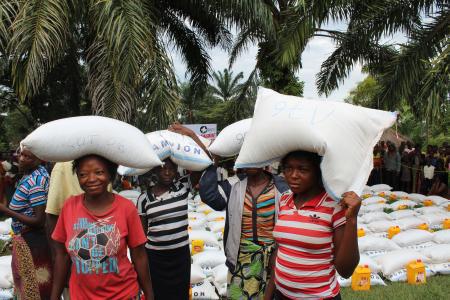Strengthened by emergency food, 700 families displaced by violence in the Kasai region of the Democratic Republic of the Congo (DR Congo) are preparing to plant crops and to raise pigs to support themselves.
In partnership with Mennonite Central Committee (MCC) and other partners, three Mennonite World Conference member churches in DR Congo (Communauté des Eglises de Frères Mennonites au Congo [CEFMC], Communauté Evangélique Mennonite [CEM], Communauté Mennonite au Congo [CMCo]) have provided tools for farming, trauma healing, and school.
Displaced families living in the cities of Kikwit and Tshikapa and the Kabwela area of DR Congo are among more than 1.4 million people who were forced from their homes.
The fighting between local militia group Kamuina Nsapu and national security forces, which began in August 2016, subsided after a year and the death of about 5,000 people, according to Reuters news agency.
However, existing ethnic hostilities have caused ongoing bloodshed in parts of the region.
About half of the displaced people have been able to return home, according to United Nations reports. Others cannot go back because it's not safe or because their homes no longer exist, said Mulanda Juma, MCC representative in DR Congo.
Monthly food distributions
MCC has been helping Congolese churches reach out to the displaced people in their communities. Today, 1,180 households are receiving monthly food distributions.
Petronie Lusamba, a mother of four whose husband was killed in the violence, said the food has made a big difference.
"My health and my children's health is so good because of the food. I thank MCC a lot," she said.
Bolstering unity
Learning to distribute food fairly and to plan for future projects has been beneficial for church relief committee members, said Mulanda Juma. As members worked together to decide where to distribute food, they had to face their own biases against other ethnic groups.
"The food assistance has created some kind of unity," Mulanda Juma said.
Back in school
All three churches are helping displaced children move on with their lives by making sure they have uniforms and school supplies.
In February 2018, Kanku Ngalamulume told Mulanda Juma that he saw his parents and siblings being beheaded. He escaped to Tshikapa with some neighbours.
"I have no hope for [any] reason," he said.
Today, Kanku Ngalamulume is living with one of the relief committee members in Tshikapa. He has regular food and goes to school.
"He's healthy and smiling," says Matthieu Abwe Luhanglea, MCC's program manager in DR Congo.
Moving forward
Small changes encourage Mulanda Juma as he works with the churches to address ongoing needs.
In addition to MCC, organizations supporting the churches' ministry to displaced people include Africa Inter-Mennonite Mission; Caisse de Secours, International Community of Mennonite Brethren (ICOMB); MB Mission/Multiply; Mennonite Church Canada Witness; Mennonite Mission Network; Mennonite World Conference; and Konferenz der Mennoniten der Schweiz (Alttäufer)/Conférence Mennonite Suisse (Anabaptiste).
"It's making a difference," says Mulanda Juma.
Originally from: Mennonite Central Committee
CCD reprinted with permission.











